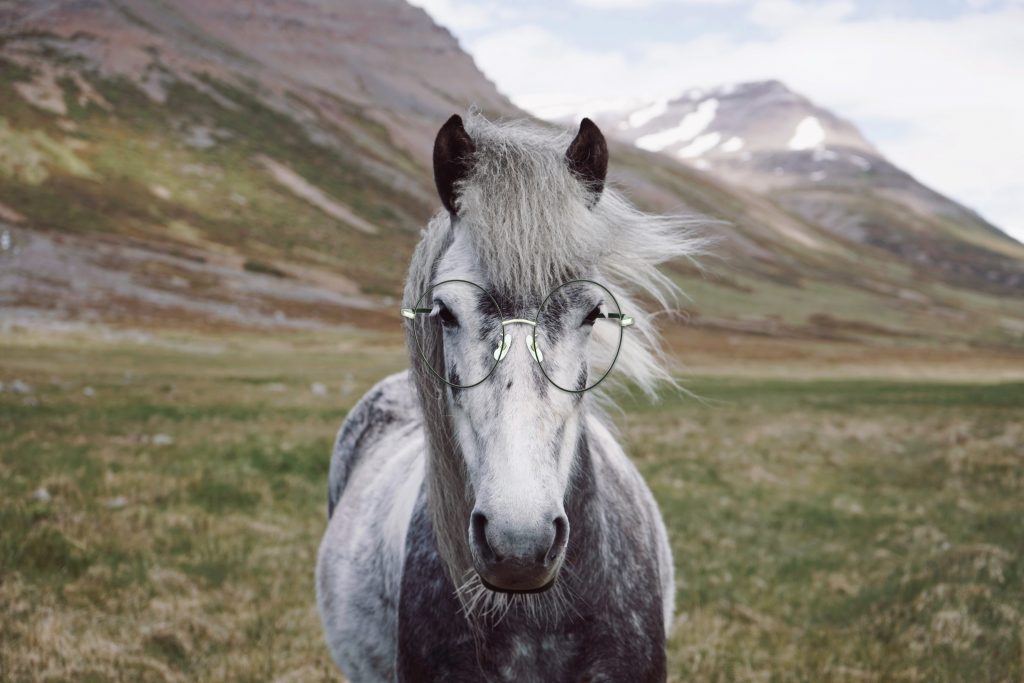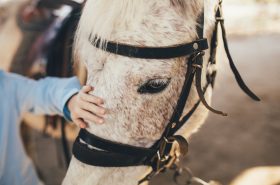If you judge strictly by the numbers any horse 15 + years of age is considered a senior horse, but advances in equine healthcare and management are re-defining those numbers. You might even say that 30 is the new 20 when it comes to your much-loved golden oldie.
A number of years ago, our senior Quarter Horse, Folly, was a neighborhood marvel. At 31 years young, Folly cantered circles around his younger pasture mates. He had no trouble keeping a steady weight on, he was neither too fat nor too thin, and his chestnut coat shone like a copper penny.
Our horse neighbors asked us how we did it, but the truth was, just a few years prior, Folly’s condition was less than stellar. He was too thin, his coat had faded to a dull reddish-brown, and he’d already suffered numerous gas colic episodes. Worse yet, his normally spunky attitude had gone standoffish and irritable. After a veterinary check-up to rule out any serious problems, we simply tweaked Folly’s nutrition and health program to better serve his new senior status.
In just a few months on the new plan, Folly looked a whole lot better. On the advice of our veterinarian and an equine nutrition expert, we switched Folly to a softer-stemmed hay and added a few key supplements. Then we increased his turnout and monitored his condition weekly. What a difference these relatively minor changes made in Folly’s quality of life.
Folly’s challenges taught us an important lesson. Never accept poor physical condition simply because your horse is advancing in years. Doing so is a common mistake as one equine health study showed. In this 2010 study, led by Gina Pinchbeck, BVSc, CertES, PhD, senior lecturer in Epidemiology at the School of Veterinary Science, University of Liverpool, England, researchers found that as horses aged, owners cut back on preventative health care measures including vaccination, dental and farrier care, and even routine veterinary exams.
A substantial portion of our equine population are greater than 15 years old. The life span of horses and ponies is increasing. Some horses remain active well into their 20s and many live up to 40 years of age. Addressing the challenges of your senior horse preventatively, will help him live a longer and happier life.
We developed a health plan for Folly designed specifically for the senior horse and combined it with a good preventative health care program. To help you achieve the same, we’ve identified some of the most common senior health challenges.
Oral Health
Your senior horse’s oral health is his passport to good nutrition. Digestion begins in the mouth so if your oldster is having trouble grinding his hay or grain, he’s at risk for malnutrition, colic, laminitis, and choke. Depending on the quality of his forage and even genetics, his teeth may develop sharp hooks, points, or waves caused by abnormal wear and tear. If you think of your horse’s teeth as a mechanical pencil, more and more lead is revealed as he gets on in years until eventually, between 30-35 years of age, there’s simply no more lead left in the pencil. Long before this your horse may require a softer-stemmed hay.
Senior dental problems create a perfect breeding ground for bacteria and that bacteria can leach into the bloodstream infecting other organs. Quidding (dropping wads of wet grass, hay, or grain from the mouth), refusing the bit, weight loss, or bad breath are all signs of a problem. We scheduled Folly for twice yearly dental exams so that we could ward off minor issues before they caused him trouble.
Nutrition
As your horse ages, his digestive system may weaken. Keep his gut healthy by providing plenty of fresh, ambient water at all times and in all seasons. Increase forage, but be sure the forage you choose is easily digested. A good timothy/orchard grass mix works best for most senior horses. Chopped forages are good, but many are too high in fiber to be easily digested by the senior horse. Plain soaked hay cubes are a better choice.
Concentrates are tough on senior digestion so avoid feeding grain if you can. If you’re sure your horse needs a little extra, look for a senior ration that offers a 12% protein, limited calcium (<1.0%) and slightly increased phosphorous (0.3-0.5%) in the total ration. Keep in mind that while some senior feeds are designed to be fed without hay, ‘grazing’ on hay fulfills an importation psychological need in your senior horse. Adding a pre and pro-biotic to your horse’s feed will help with absorption. Always offer free-choice salt as well.
Parasite Control
Parasites can take a serious toll on your senior horse. The most common culprits are large and small strongyles, Ascarids, tapeworms, pinworms, and bots. Rotational de-worming (rotating classes of anthelmintics every 4-12 weeks) is no longer recommended as parasite resistance has become more prevalent. The modernized prevention plan includes manure management, fecal egg counts, and choosing de-wormers based only on fecal egg counts. Talk to your veterinarian to design a program that works for your horse.
Exercise Needs
Arthritis is a common problem for the senior horse and difficult to avoid, but symptoms can be reduced with ample turnout in a friendly group. Be sure your senior horse is paddocked with companions that won’t force him to run, but will encourage him to move around a bit. If arthritis and joint pain is an issue, explore alternative therapies like chiropractic care and acupuncture for pain relief. Anti-inflammatory medicines can be used to help pain episodes, but are not good for the long term as most will cause gastric upset.
Your senior horse will thank you for a longer warm-up and cool down sessions after a workout.
Vision and Hearing Changes
Horses do experience some age-related vision and hearing changes, but the good news is, it doesn’t always effect their lifestyle. Some senior horses develop cataracts, but unlike their human counterparts, most of these rarely progress to vision loss.
The most common eye malady in horses over the age of 20 are corneal ulcers. Owners first see them as bumps on the lower lid and they’re easily treated with antibiotics.
Signs your horse may be experiencing vision changes include tripping, bumping into things, spookiness, and suddenly becoming head shy. You might have to adjust his care and environment to accommodate.
We can’t protect our horse from all the effects of aging, but we can help him age gracefully. Most important is to remain vigilant to changes in his condition. If Folly had the gift of speech, we think he’d say that in horse years, thirty felt like the new twenty. We wouldn’t have it any other way.
**Karen Elizabeth Baril writes for both regional and national publications, including EQUUS Magazine, The Equine Journal, InfoHorse.com, and Animal Wellness. Follow her at www.karenelizabethbaril.com or on Linked In.




